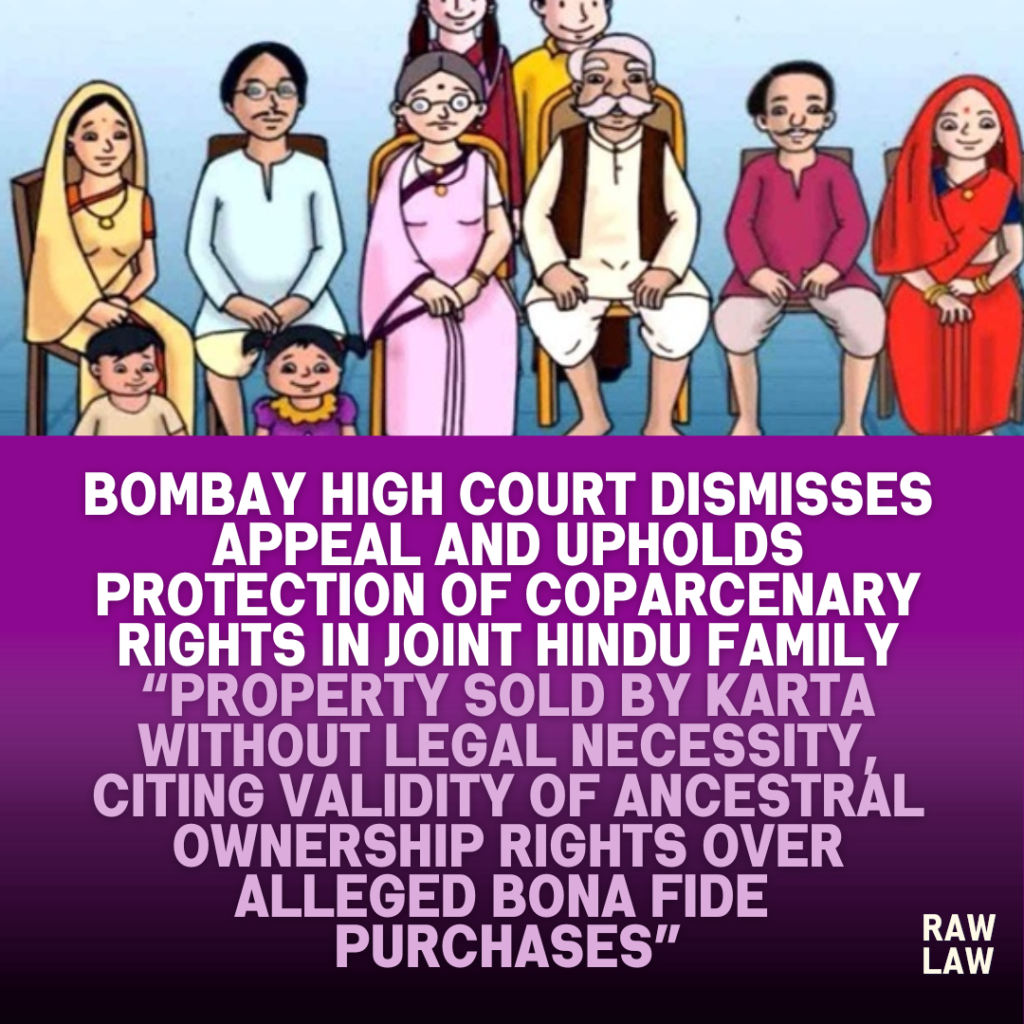Court’s Decision
The Bombay High Court dismissed the second appeal filed by the appellant-purchaser and upheld the concurrent findings of the lower courts, declaring the sale deed executed by the family Karta as not binding on the plaintiffs (coparceners). The Court concluded there was no legal necessity for the transaction, and the sale was made without safeguarding the rights of other family members. It also dismissed all connected applications and granted a limited stay of four weeks on the effect of the judgment.
Facts
The suit property originally belonged to Narayan, who passed away in 1965. His sons, daughters, and legal heirs formed a joint Hindu family. The eldest son, acting as Karta, sold ancestral land via a registered sale deed in 2001 to the appellant. In 2002, the plaintiffs learned about the transaction through a revenue notice and initiated proceedings challenging the sale. The civil court and first appellate court both declared the sale not binding on the coparceners, finding no legal necessity for the alienation.
Issues
- Whether the sale deed executed by the Karta was binding on the joint family members despite lack of consent.
- Whether the suit was filed within the prescribed period of limitation.
- Whether the purchaser could claim rights based on a sale deed executed without legal necessity.
Petitioner’s Arguments
The appellant argued that the sale deed was valid at least to the extent of the Karta’s own share. It was further contended that the suit was barred by limitation, being filed three years after the sale. The appellant argued there was no requirement for coparcener consent when the Karta executed the sale and invoked protection under Section 44 of the Transfer of Property Act. Reliance was placed on judgments holding that absence of challenge within the limitation period bars the claim.
Respondent’s Arguments
The plaintiffs submitted that they were unaware of the sale until they received notice from the revenue authorities in 2002, and the suit was filed within three years thereafter. They asserted that the Karta had no authority to unilaterally alienate joint family property without legal necessity or benefit to the estate. They pointed out the purchaser made no enquiries into necessity and took no steps to involve other coparceners.
Analysis of the Law
The Court applied Section 59 of the Limitation Act, which grants three years from the date of knowledge of the alleged fraudulent transaction. It reiterated the principle that the purchaser from a Karta is bound to prove legal necessity or due inquiry. The Court rejected the defence under Section 44 of the Transfer of Property Act because the sale was found voidable due to the absence of legal necessity.
Precedent Analysis
The Court relied on the Supreme Court judgments in Sunil Kumar v. Ram Parkash, laying down the purchaser’s obligation to prove legal necessity, and Parmeshwari Devi v. Mantoo Lal, clarifying that Article 110 of the Limitation Act does not apply where third-party rights are involved. Kalipada Chakraborti v. Palani Bala Devi was cited to affirm that specific limitation articles must be strictly applied without introducing ambiguity.
Court’s Reasoning
The Court found no merit in the appellant’s arguments, emphasizing the consistent findings of the lower courts on lack of legal necessity. The Court noted the purchaser’s own admissions regarding absence of due diligence and found no substantial question of law arising in the appeal. It also observed that the appellant had not claimed partition or possession to the extent of the seller’s share.
Conclusion
The High Court dismissed the appeal and upheld the lower courts’ decree declaring the sale deed void against the plaintiffs. It refused to interfere with the concurrent factual findings and dismissed connected interim applications, with a limited stay on execution granted for four weeks.
Implications
The judgment strengthens the rights of coparceners against unauthorized alienations by Karta, restricts the rights of purchasers who fail to verify legal necessity, and clarifies limitation principles concerning discovery of fraudulent transactions.
Referred Judgments Summary
- Sunil Kumar v. Ram Parkash: Reiterated the duty of purchaser to prove legal necessity.
- Parmeshwari Devi v. Mantoo Lal: Article 110 of the Limitation Act not applicable when stranger rights intervene.
- Kalipada Chakraborti v. Palani Bala Devi: Strict adherence to applicable limitation provisions mandated.
FAQs
1. Can a Karta sell joint family property without the consent of other members?
No, unless there is legal necessity or benefit to the estate, the Karta cannot unilaterally alienate joint family property.
2. When does the limitation period start in such property disputes?
Limitation starts from the date of knowledge of the sale, not from the date of sale itself.
3. Can a purchaser claim rights under Section 44 of the Transfer of Property Act?
No, if the sale is vitiated by lack of legal necessity, the purchaser cannot claim rights under Section 44.
